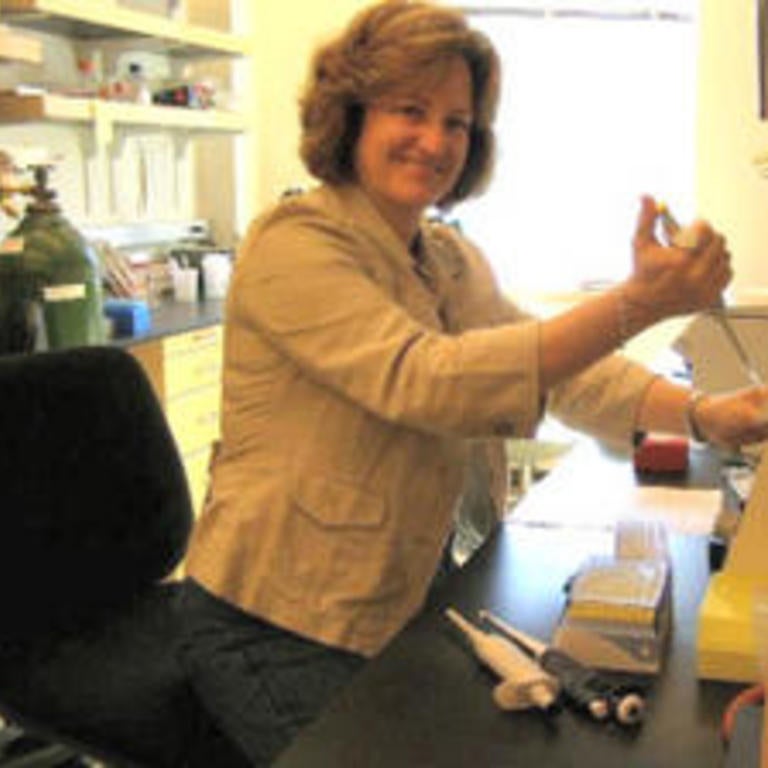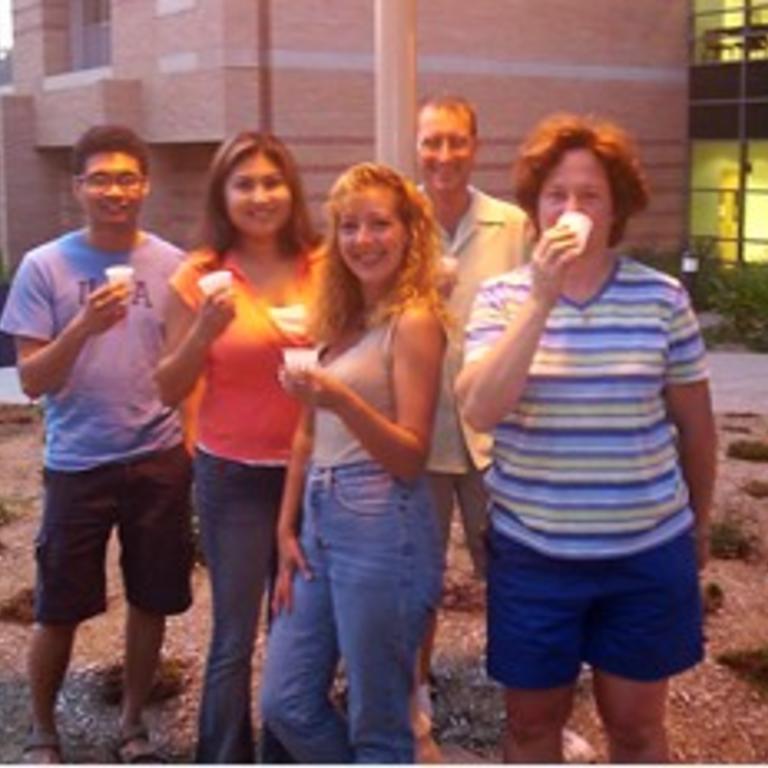CV - MArgarita Curras-Collazo
Honors and Awards
2019 Fellow of the American Physiological Society
2016-present Editorial Board, American Journal of Physiology, Metabolism and Endocrinology
2016 Academy of Distinguished Teachers, Academic Senate, UC Riverside
2013 Teaching Career Enhancement Award, American Physiological Society
2013 McKnight Progressive Educator Award, American Physiological Society
2011 Distinguished Teaching Award, Sciences, Academic Senate, UC Riverside
2010 Nominated, Innovative Teaching Award, UC Riverside
2009 Best Publication Award, UC Toxic Substances Research and Teaching Program
2007 Abstract selected for the Society for Neuroscience Press Book
2002 Faculty Mentor of the Year, University Honors’ Program, UC Riverside
2001 Nominated by UC Riverside, Howard Hughes Medical Institute Professor Grant
2000 Distinguished Faculty Mentor, Chancellor’s Award for Excellence in Undergraduate Research, UC Riverside
1997-98 UC Regents' Faculty Fellowship
1997-98 UC Regents’ Faculty Development Award
1995-96 UC Regents' Faculty Fellowship
1993-94 Individual National Research Service Award (NRSA), NIH
1990-92 American Epilepsy Foundation of America Postdoctoral Fellowship
1989-90 NIH Traineeship, Neurobiology Program Training Grant, University of North Carolina
1988 Hispanic Student Leadership Award, The Ohio State University
1987-88 Presidential Fellowship, The Ohio State University
1987 Graduate School Leadership Award, The Ohio State University
1986 Travel Fellowship for Minority Neuroscientists, Society for Neuroscience
1986 ICSABER Biomedical Research Society Award, The Ohio State University
1983-85 Minority Predoctoral Fellowship, The Ohio State University
Grant and Fellowship Review Panels
Advisory Board, President’s Postdoctoral Fellowship Committee, Univ. California, Office of the
President, 2003-present
Grant Panel, Life Sciences Selection Committee, President’s Postdoctoral Fellowship Program,
University of California, Office of the President, 2007, 2010-2016 (Chair 2007, 2012, 2018, 2020)
Selection Panel, Neuroscience and Physiology, GRFP, National Science Foundation, 2003-04,
2006-09, 2011-2012
Evaluation Panel, Cognitive, Neural, and Behavioral Sciences, National Defense Science and
Engineering Graduate Fellowship Program, 2007
Grant Panel, Anesthesiology, Brain, Cardiorenal, Lung, Respiration & Resuscitation, Surgery,
American Heart Association, Western States Consortium Peer Review, 2004-2007
Advisory Board in Neuroscience, National Science Foundation, 2003-04
Grant Panel, Neuroendocrinology Program, Division of Integrative Biology & Neuroscience,
National Science Foundation, 2000-2003
Grant Panel, UC MEXUS-CONACYT, Health and Medical Sciences, University of California
(systemwide), 2001
National and Regional Committees
Invited Member, ADI Mastermind Group, American Physiological Society, 2020
Invited Participant, STRIDE Brainstorming Summit, American Physiological Society, 2018, 2020
Member, Inaugural Conference Program Committee, California Chapter, American Physiological
Society, 2019
Invited Member, Central Nervous System Steering Committee, American Physiological Society,
2011-2016
Chair, Porter Physiology Development and Minority Affairs Committee, American
Physiological Society, 2014-2016 (member 2011-2013)
Liaison to PPDMAC, Committee on Careers & Professional Development, American Physiological Society 2014-2016
Advisory Board, Trainee Advisory Committee, American Physiological Society, 2014-2016
Conferences Organized and Sessions Chaired
2020 Session Co-Chair, The effect of exogenous neuropeptides on central signaling and
behavior, 23rd International Symposium on regulatory peptides, Acapulco
Diamante, Mexico, 2020 (scheduled)
2017 Session Co-Chair, Neurotoxicity of Legacy and Emerging Persistent Organic Pollutants
(POPs) (Metabolism and Toxicology), International Symposium on Halogenated Persistent
Organic Pollutants (POPs) - DIOXIN 2017, Vancouver, Canada
2015 Organizing Committee, Int’l Symposium on Persistent Toxic Substances, UC Riverside,
Riverside, CA
2010 Invited Moderator, Roundtable Meeting, Student Research Program, American Heart Association,
San Diego and Irvine, California
1991 Session Chair, Glutamate Receptor Pharmacology, European Neuroscience Meeting, Flims,
Switzerland
Invited Lectures at National and International Scientific Meetings
-
Dysregulation of Hypothalamic Gene Expression and the Oxytocinergic System by Soybean Oil Diets in Male Mice, 23rd International Symposium on Regulatory Peptides, Acapulco Diamante, Mexico, September 18-22, 2020 (scheduled)
-
Adult or developmental exposure to PBDEs alters hepatic enzymes related to carbohydrate metabolism and oxidative stress in mice that show a diabetic phenotype, 39th International Symposium on Halogenated Persistent Organic Pollutants – DIOXIN 2019, Kyoto International Conference Center, August 25-30, 2019
-
Neurotoxic effects of developmental exposure to DE-71 on forebrain social peptides, social behavior, and olfaction in C57BL/6 mice, 39th International Symposium on Halogenated Persistent Organic Pollutants – DIOXIN 2019, Kyoto International Conference Center, August 25-30, 2019
-
Altered neocortical circuitry in mice exposed perinatally to polybrominated diphenyl ethers, 37th International Symposium on Halogenated Persistent Organic Pollutants (POPs) - DIOXIN 2017, Vancouver, Canada, August 23, 2017
-
Permanently compromised nitric oxide signaling necessary for neuroendocrine function after early life exposure to PCBs, International Toxicology Summit & Expo, Houston, TX, October, 2016
-
Developmental exposure to indoor flame retardants exaggerates blood pressure responses by altering activity in neuroendocrine, endocrine and autonomic nervous systems, International Symposium on Persistent Toxic Substances, Riverside, CA, November 17, 2015.
-
Toxic couch chemicals increase the risk of hypertension and abnormal stress responses, LSU, Baton Rouge, LA, March, 2015
-
Developmental PBDE exposure increases blood pressure and hypothalamic-pituitary-adrenal axis activity in osmotic challenged rat, American Autonomic Society, San Juan, Puerto Rico, November 8, 2014
-
Developmental Exposure to PBDEs increases risk of Hypertensive responses and augments hypothalamo-pituitary-adrenal activity, Laverne University, Laverne, CA, September 24, 2014
-
Developmental Exposure to PBDEs increases risk of Hypertensive responses and augments hypothalamo-pituitary-adrenal activity, Department of Biotechnology, Pontifical Catholic University, Ponce, Puerto Rico, September 20, 2014
-
Developmental exposure to PBDEs dysregulates neuroendocrine and physiological systems relevant to homeostasis and stress, Int’l Toxicology Summit & Expo, San Antonio, TX, Nov. 23, 2012
-
Indoor flame retardants disrupt dendritic growth in primary cortical cultures by interfering with thyroid and vasopressin receptor signaling, International Toxicology Summit & Expo, Hilton San Antonio Airport, San Antonio, TX, November, 2012
-
Neuroendocrine disruption caused by the indoor organohalogen pollutants PBDEs, UCMEXUS Symposium Toxic Earth Toxic Bodies, Binational Perspectives on Environmental Health, University of California, Riverside, March 2011
-
Exposure to fire retardant chemicals before birth can permanently harm the neuroendocrine system and alter body water regulation and cardiovascular function, MARC and URC/CARE program groups at UCLA and Mount Saint Mary’s College, UCLA, Los Angeles, CA, May 17, 2011
-
PBDEs and PCBs suppress osmotically elevated vasopressin and nitric oxide content in the rat magnocellular nuclei, 1st International Symposium on Neuroendocrine Effects of Endocrine Disruptors (NEED), Rouen, France, June 2010
-
Exploring the Neurobiological Effects of the Environmental Toxicants Domoic Acid and PCB/PBDEs, Department of Pharmacology, University of Otago, New Zealand, August, 2009
-
Amplification of osmotically elicited local vasopressin release by PACAP and nitric oxide-dependent glutamate signaling, Center for Neuroendocrinology, Department of Pharmacology, University of Otago, New Zealand, August, 2009
-
New information on how exposure to fire retardant chemicals before birth can permanently harm the neuroendocrine system, body water regulation, and cardiovascular function, Green Science Policy Institute, University of California, Berkeley, 2008
-
Amplification of osmotically elicited local vasopressin release by PACAP and nitric oxide-dependent glutamate signaling, Workshop on dendritic peptide release, Society for Neuroscience Meeting, San Diego, CA, November, 2007
-
Perinatal Exposure to Aroclor 1254 Induces Long-Term Suppression of Osmotically Induced Nitric Oxide Synthase Activity in Neuroendocrine Cells of the Rat Supraoptic Nucleus, 27th International Conference on Halogenated Environmental Organic Pollutants, Tokyo, Japan, September, 2007
-
Dietary exposure to the PCB mixture Aroclor 1254 may compromise osmoregulation by altering central vasopressin release, Neurotoxicity of Persistent Chemicals, 24th International Symposium on Halogenated Environmental Organic Pollutants and POPs, Berlin, Germany, September, 2004
-
Neuromodulation of neurosecretory cells by vasopressin: Possible role of PACAP, Instituto de Psiquiatria, Division de Neurociencias, Mexico City, Mexico, March 2002
-
Properties of NMDA receptor channels in the SON: possible role in the synaptic modulation of neurosecretory cells during osmotic activation, The Synaptic Control of Magnocellular Neurosecretory Neurons, A Workshop, Satellite to the 2000 Society for Neuroscience Meeting, New Orleans, LA, November, 2000
-
Differential excitotoxic susceptibility of cortical neurons and hypothalamic neuroendocrine cells in a rat model of stroke, Tenth Medical Symposium: Research Day, Ross University, School of Medicine, Portsmouth, Dominica, West Indies, March, 1999
-
Selectivity of amino acid transmitters acting at N-methyl-D-aspartate and amino-3-hydroxy-5-methyl-4-isoxazolepropionate receptors, Postsynaptic Glutamate Receptors Session, Society for Neuroscience, New Orleans, LA, 1991
-
Excitatory Amino Acids: an Update, Satellite of the XIth International Union of Pharmacology (IUPHAR) Congress, Flims, Switzerland, June 28-29, 1990.






